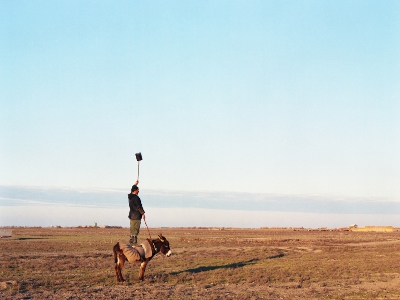 Today’s guest post is from Afterschool’s director Antonio Campos.
Today’s guest post is from Afterschool’s director Antonio Campos.
I met Babak Jalali in the summer of 2006 when we were both accepted into the Cannes Residence. We then spent close to 5 months living in a glorious Parisian apartment working on our scripts, me on Afterschool, Alexis Dos Santos on Unmade Beds, Fien Troch on Unspoken, Sebastian Lelio on Navidad, and Babak on Frontier Blues. Though we are all very supportive of one another in the Residence, we were all nervous about showing one another our scripts until the very end. I think both Babak and I both had the feeling that we liked one another’s scripts but weren’t sure how it was all going to translate to screen. And when did see each other’s films, we were all pleasantly blown away.
I sent out an email to everyone I knew in New York to entice them to come see Babak’s Frontier Blues (his first feature) playing at New Directors/New Films this weekend. I mentioned that the film was not only beautiful but “beautifully strange” and unlike anything I had seen before. This intrigued Mr. Hope, and he asked me to expand.
What is so wonderful about the film, and also his previous short, “Heydar: An Afghan in Tehran”, is that he is showing us a view of Iran that most of us here have never been exposed to— a perspective free of politics and chaos in a part of Iran that most of us could only see in photo books. And while those photographs reveal the beauty and majesty of northern Iran, they cannot reveal the humanity that Babak is exploring in his film. There are no photos that could capture that monotony of every day life for Alam who works on a chicken farm but who is desperately in love with a girl he has never spoken to. Or Hassan, the village idiot, who’s best friend is his donkey and his uncle Kazem who owns a small clothing store where nothing quite fits any one who comes in. And the minstrel who tells the audience of his wife, stolen from him by a man in a green Mercedes years ago.
Growing up in Gorgan, the town where the film takes place, and returning frequently after leaving there in his teens, these are the people around which he grew up. Babak is fascinated with the people that most of us walk by everyday but don’t notice. Walking through New York with Babak, he can not help but stop and appreciate the long, wrinkled face of an old man whose eyes stare off into the distance with a sense of loss for a life full of regrets and what if’s. Or the bus boy in a restaurant bustling from one table to the next and back and forth to the kitchen. Who or what does he go home to every night? What are his dreams? Who does he love?
The people that inhabit Frontier Blues are settled but lost. They long for something better or long for what they could have had, but they continue to live and work every day. The majestic beauty of northern Iran is merely a backdrop, one that doesn’t impress them anymore the way they do outsiders. They are stoic and laconic men, maybe more so than if they were not on camera, but in some ways, that is the point. Babak is looking deeply into them and this often requires a bit of silence and focus, and what he finds is truly beautifully strange.
This weekend at New Directors/New Films: Fri Apr 2: 6:15 (MoMA) / Sun Apr 4: 5:30 (FSLC





